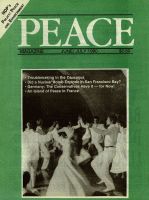
Peace Magazine Jun-Jul 1990, page 5. Some rights reserved.
Search for other articles by various here
When the Open Skies proposal was first made in 1955 by President Eisenhower, Khrushchev rebuffed it and called it a "bald espionage plot." A completely different response was given by Soviet Foreign Minister Shevardnadze to the more recent Open Skies proposal; he wanted to expand it to include "open land, open seas, and open space." Now it is the Americans who want to limit the plan-although the press has not made that fact apparent. Western reporters have blamed the Soviet Union for the failure to reach agreement. Their reporting has aceurately reflected the statements of Canadian officials, but not those of Soviet officials.
The United States flatly rejected the Soviet Union's proposal for equal sharing of information, equality of equipment, and U.N. involvement. Ironically, it was President Eisenhower in 1960 who initially proposed that the U. N. operate an aerial reconnaissance fleet.
Unless the Open Skies agreement provides for open sharing of all gathered information and the use of surveillance equipment of equal quality, it will not be a truly confidence-building measure.
As the new East/West relationship develops, it is vital that the U.N. play a central role and be given the tools to carry out its important work. It is not realistic now to change the proposals already being developed by the NATOI Warsaw Pact negotiators for an Open Skies Treaty. However, a parallel agreement can and should be negotiated elsewhere to establish such capability for the United Nations.
Walter Dorn, Toronto
A lot more than $100 megabucks worth of CF-18 came tumbling down last Tuesday over the city of Karlsruhe where I spent seven tranquil years of my youth. The real fallout of this air-crash is that it brought down to earth, to the West German man and woman in the street, the realization of just how absurd has become our continued Cold War defence posture in Europe.
If, according to a recent poll, 56.5% of Germans welcome a total U.S. troop withdrawal (ref. Globe and Mail April 12, "West Germans Favor U.S. Troop pullout, Poll Shows") then this week's double whammy-which by grace of God did not kill anyone on the ground -must have swayed many of the 38.6% who wanted the troops to stay.
It is understandable that the Canadian Military go on pretending it's business as usual. But the Prime Minister must be clear about the tone of Bonn's urgent request to Ottawa to cease all CF-18 flights: The ordinary German is becoming indignant.
Isn't it time that our government adopted a new stance toward Europe? let's turn swords into ploughshares! We must spend our high-tech resourcefulness not on destructivity but on productivity-assistance and pollution clean-up expertise. We have "world-class" know-how in both of these fields and can make a name for our capabilities far more effectively than with our aerial acrobatics. We could even use some of our technically trained ground forces stationed in Germany as a platform to set-up a technology teaching task force whose objective would be to help the Eastern European economies get back on their feet.
The millions deployed in such a new and imagi native foreign policy initiative would open up a multi-billion dollar market to Canadian automation and process control equipment manufactures, from which we are all but excluding ourselves on our present course.
Hans Modlich, Rexdale, Ontario
We want to bring to your attention the dangerous circumstances surrounding six prisoners of conscience in Vietnam. Although these nonviolent Buddhist monks have been held under arrest for several years, their situation is worsening and action is required to guarantee their safety.
On April 6, 1977, in Saigon, six leaders of the Vietnamese Unified Church were arrested by their government. Among them were Ven. Thich Huyen Quang, Deputy President, and Ven. Thich Quang Do, Secretary General of the Buddhist Church. Both of these monks have been nominated for the Nobel Peace Prize, for their dedication to nonviolent reform in Vietnam. In February of that year, they were sent into exile in their native villages, "to prevent them from endangering the security and order of the city" (Decision 71/QD-UB of the Vietnamese Government).
Two other monks, Rev. Thich Tue Sy and Rev. Thich Tri Sieu, were arrested on April 2, 1984. They are both respected professors from Van Hanh University in Saigon. Along with them, two other monks, Rev. Thich Nu Tn Hai, and Ven. Thich Due Nhuan, were taken in police custody. The two professors have been sentenced to death, and the status of the other four remains unclear. Presumably they are also being held under desperate conditions and may also be executed at any time. Since Canada supports the preservation of human rights worldwide, we urge you to voice this country's anger at the Vietnamese Government's treatment of these noble proponents of nonviolence, and ask for their immediate release. We suggest that Mr. Perez de Cuellar, Secretary General, raise the issue in the U.N. forum to investigate the situation.
Khanh le Kim, Vietnamese Buddhist Association, Toronto

Peace Magazine Jun-Jul 1990, page 5. Some rights reserved.
Search for other articles by various here